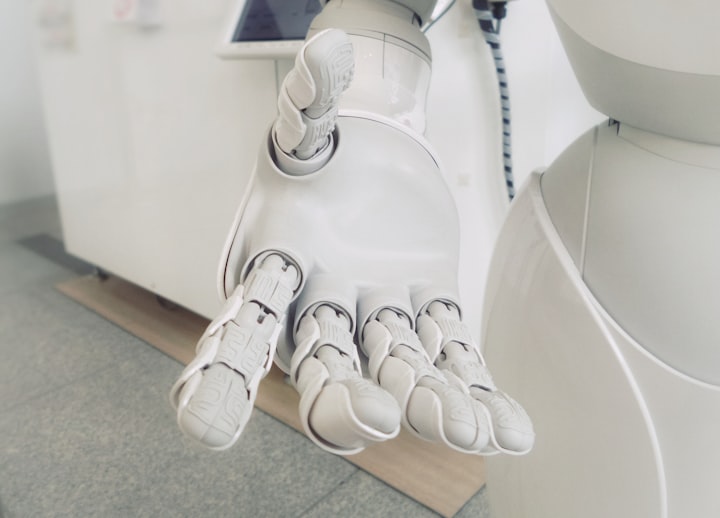How To Melt Away Writers Block In 5 Simple Steps
Write more make more

Meditation is a fantastic way to improve your mental and physical health. However, it can be tricky to know how to get started. If you’re new to meditation, don’t worry — it’s easy to create a blissful practice with just a few simple steps.
Start with a comfortable seat.
Whether you’re sitting on the ground, in a chair, or on a Yoga mat, make sure that you’re comfortable. If you’re not comfortable, you’ll likely find it difficult to focus on your meditation.
Set a timer for however long you’d like to meditate.
If you’re new to meditation, you may want to start with just 5 or 10 minutes. Once you get more comfortable with the practice, you can start to increase the length of your meditation.
Close your eyes and focus on your breath.
Once you’re seated comfortably, close your eyes and focus on your breath. You may want to count each inhale and exhale, or simply focus on the sensation of your breath moving in and out of your body.
Once your mind starts to wander, redirect your focus back to your breath.
The mind will likely wander during meditation, but that’s okay! Whenever you notice your thoughts drifting, simply redirect your focus back to your breath.
Finish by opening your eyes and taking a few deep breaths.
When you’re finished meditating, take a few deep breaths and slowly open your eyes. You may want to spend a few moments sitting in silence, or you may want to get up and move around.
Congratulations! You’ve just read my first AI generated blog. Writers block is a thing of the past.
Don’t worry no one cares? Well, some might. And to that question should AI be allowed as a writing tool on blogs remains to been. What’s your take on the issue?
Is AI going to replace writers?
While AI won’t replace writing as a profession, it will replace certain types of writing jobs. The writers who adapt to this will continue to thrive and find new opportunities, and those that don’t, won’t.
Join the millions of writers already on the AI bandwagon. 100 articles per month no problem. But, will anyone read it?
See for yourself. Try this software for free!
Artificial intelligence is one of the most talked-about topics in the world today. But what is it, really? And what does it mean for you and me? In this blog post, we’re going to answer those questions and more.
What You Need To Know About AI
In recent years, artificial intelligence (AI) has become more prevalent in our lives and has started to transform the way we live and work. From driverless cars to robots that can perform surgery, AI is changing the world as we know it.
But what exactly is AI? And what does it mean for the future? In this blog post, we will explore what AI is, the benefits and risks of AI, and some ethical considerations to keep in mind. We will also provide some resources for further learning. So if you’re interested in learning more about AI, read on!
What is AI?
Put simply, artificial intelligence is the process of using computers to simulate or carry out intelligent tasks. This can range from something as simple as recognizing patterns or making predictions, to more complex tasks such as decision-making or natural language processing. AI is often used in specific applications, such as: -Autonomous vehicles -Fraud detection -Predicting consumer behavior -Improving search results
What are the benefits of AI?
There are many potential benefits of artificial intelligence. Some of the most notable ones include: -Improved accuracy and efficiency: By automating tasks that are currently carried out by humans, AI has the potential to improve accuracy and efficiency in a variety of domains. For example, autonomous vehicles can reduce the number of accidents on the roads, and AI-powered chatbots can provide quick and accurate customer service. -New insights and discoveries: By analyzing data in new ways, AI can help us to uncover previously hidden relationships and trends. For example, AI is being used in the healthcare industry to develop new treatments for diseases and to improve patient care. -Greater efficiency and productivity: In general, AI can help us to do more with less. For instance, businesses can use AI to automate repetitive tasks, freeing up employees to focus on higher-level tasks.
What are the risks of AI?
While there are many potential benefits of artificial intelligence, there are also risks that need to be considered. Some of the most notable risks include: -Job loss: One of the most commonly cited risks of AI is job loss. As AI-powered machines increasingly automate tasks that are currently carried out by human workers, there is a fear that many people will be rendered unemployed. -Bias and discrimination: Another risk of AI is bias and discrimination. This can occur when AI systems are trained on data that is biased or when they are used to make decisions about people (such as in the case of credit scoring or hiring). This can lead to unfair and potentially harmful outcomes for individuals who are affected by these decisions. -Privacy concerns: AI can also pose a risk to privacy. For example, facial recognition technology can be used to identify individuals without their consent, and AI-powered bots can collect and store data about people’s online activities.
How can I get started with AI?
If you’re interested in getting started with AI, there are a few things you can do: -Educate yourself: One of the best things you can do is to educate yourself about AI. This will help you to understand the technology better and to make more informed decisions about its use. -Get involved in the community: There is a growing community of AI enthusiasts and experts. Getting involved in this community will allow you to stay up-to-date on the latest developments in AI and to network with other people who are interested in the technology. -Look for opportunities to use AI: Many businesses are starting to use AI in a variety of different ways. If you’re interested in using AI, look for opportunities to do so in your work or in your personal life.
What are some ethical considerations with AI?
As artificial intelligence becomes more prevalent in our lives, it’s important to consider the ethical implications of its use. Some of the ethical considerations that need to be taken into account include: -The impact of AI on jobs: As mentioned above, AI has the potential to automate many tasks that are currently carried out by human workers. This could lead to large-scale job losses, which would have a significant impact on society. -The impact of AI on society: AI can also have a significant impact on society as a whole. For instance, AI-powered bots could be used to influence public opinion or to manipulate behavior. -The impact of AI on individuals: AI can also have an impact on individuals. For example, AI-powered chatbots could be used to sell products or services, or to collect data about people without their consent.
Where is AI headed?
Artificial intelligence is developing rapidly and it’s difficult to predict exactly where it will headed. However, there are a few possible directions that AI could take in the future: -More widespread use: AI is likely to become more widespread in the coming years. This could lead to the automation of many tasks that are currently carried out by human workers, as well as the development of new and innovative applications of AI. -Greater AI control: As AI becomes more widespread, there is a possibility that a small number of people or organizations could gain control over the technology. This could lead to a concentration of power and a potential for abuse. -Higher levels of AI: In the future, AI could reach higher levels of intelligence, possibly surpassing human intelligence. This could have a profound impact on society and the economy, and it’s important to consider the ethical implications of this possibility.
Other writing by author
SOLO - 10 Years in Bali
About the Creator
Arlo Hennings
Author 2 non-fiction books, music publisher, expat, father, cultural ambassador, PhD, MFA (Creative Writing), B.A.






Comments
There are no comments for this story
Be the first to respond and start the conversation.